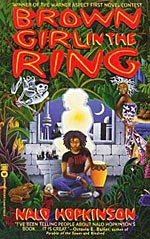
![]() digitaltempest
digitaltempest
1/3/2016
![]()
I know this book is classified as science fiction, but honestly, it felt more like urban fantasy to me. At best, it was science-fantasy because it does have some science fiction elements. However, those things aren't nearly as pronounced to me as the fantasy portion of the novel.
Downtown Toronto has been abandoned by the Canadian government after a series of financial disasters that lead to an economic depression. They've blocked the people from leaving the hellhole it's become, but those who have money move to the suburbs are allowed to keep their illusion of safety while those who don't are forced to stay in Toronto and fend for themselves, which is largely made of a society of people of color.
Depending on the ways of their ancestors, despite their ugly surroundings and reality, they've built up this society that focuses on bartering and relying on the old ideas of their people ranging from India to the Caribbean. That could come in the form of food or knowledge of the land or that can come in the form of more fantastic elements.
Ti-Jeanne is a new mother who hasn't named her baby. She's recently moved back in with her grandmother, Gros-Jeanne, due to the baby's father being an addict and needing support that she knows her grandmother can provide. Despite that, Ti-Jeanne fears her grandmother's herbalism and spiritualism powers. She also fears that they may be manifesting in her as her dreams begin to plague her, and she is reluctant to give into that side of her family, especially since her grandmother said the visions made her mother mad before she disappeared. However, there are evils in their city that Ti-Jeanne will eventually have to find the courage to face as she learns not to fear who she is.
This is one of the books that I choose from the 2014 Speculative Fiction by Authors of Color Challenge because I wanted to read more spec fic by authors of color. This was a beautifully written book that incorporated so much cultural character to the story. Quotes like this just made my whole reading experience:
"Tony could give sweet, sweet talk. Words so nice, they would charm the money from your pocket, the caution from your heart, the clothes from your body. Words so sweet and soothing, they sounded like love, like let me hold you the way your mama never held you, like come and be my only special one, my doux-doux darling. Words that promised heaven."
So lyrical and full of flavor and culture, exactly what I've been wanting and looking for in my science fiction and fantasy. Words that speak to me. Words that feel genuine. Words that I can hear people I know in my life saying. Hopkinson created a very scarred, scary, abandoned society, but at the same time, she's made it this diverse place full of colorful characters who are just trying to survive.
Now, for the main character, Ti-Jeanne. We had a torrid relationship for a moment. While I appreciated and even empathized with Ti-Jeanne's struggles with being a mother, loving a man that's "no good" for her, and trying to assert herself as a woman to her grandmother, it took me a while to connect with her character. I understood her selfishness and her anger at not only her personal situation but the situation of her city. However, that may have been part of the point to all this. Ti-Jeanne needed to learn to respect, compassion, and selflessness. She needed to learn that, while selfishness is part of human nature, one has to temper it with respect for others.
It's one of those books where you want to tell the character you are no more special than anyone else in respect to your needs or wants. Your needs do not outweigh the needs of others. Many of your needs and wants are only different from anyone else's. Many first mothers have troubles. Many of us don't have enough to feed ourselves much less others. Of course, your problems, these problems, seem worst than the next person because they're yours. However, the next person feels the same way about their problems. You are special because you are you, and no one else can say that.
However, as Ti-Jeanne grew as a character, I grew to love her much more. Her transformation from this almost girl-child pretending to be a woman to a woman who is not afraid of what power she holds, not just as her grandmother's child, but as her tragic mother's child and as a woman of power herself, is beautifully done. Her grandmother reminded me so much of my own great-grandmother who could be a curmudgeonly soul, but this is how she imparted wisdom and love. Parts of the book like that just made me so nostalgic.
I have to say I didn't quite know if I'd come out of this one loving it. I appreciated it, but it took me so long to warm to Ti-Jeanne that I was afraid I was going to like it, but it wasn't going to be that story for me. I'm grateful that I was wrong, and I look forward to more of Hopkinson's wonderfully magic books.
http://bibliosanctum.com/2014/06/24/book-review-brown-girl-in-the-ring-by-nalo-hopkinson-2/